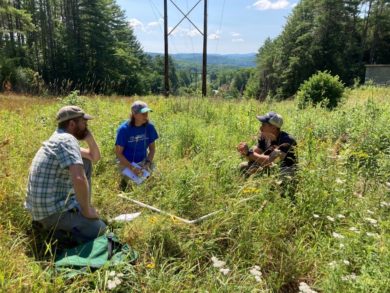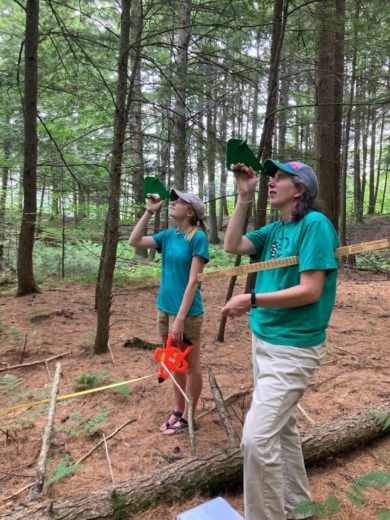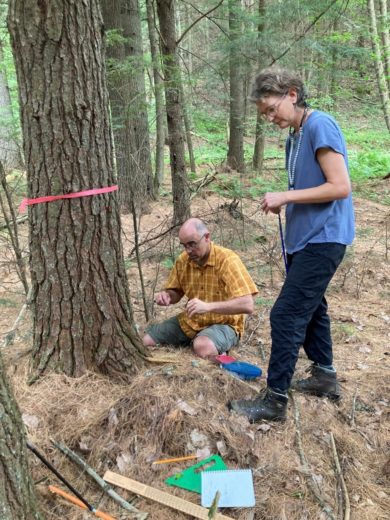
VCE Director of Conservation Science Ryan Rebozo working with Becky Proulx and Matt Dragon on plant species richness quadrats.
Are there more plant species under a powerline cut, or a 70-year-old forest? How do you calculate the timber value and carbon storage potential of a wood lot? How much does soil temperature affect invertebrate communities? All of these questions have one thing in common: we posed and investigated them with science educators during VCE’s first ever Community Science Teacher Education Workshop.

VCE EcoAmeriCorp member Abbie Castriotta and Becky Proulx using tangent height gauges to calculate the height of a tree.
Community Science has a place in just about everything VCE does: Providing members of the public opportunities to contribute to our research projects, adding observations to the Vermont Atlas of Life, even our motto “uniting people and science for conservation”. As the Vermont Atlas of Life highlights, the more individuals that contribute to community science projects, the more research questions can be tackled. Because we believe this form of science lends itself well to classroom studies, we invited local science teachers to spend a week at VCE, to work on field methods and talk community science.
Over the course of four busy days, our team of intrepid teachers took on a series of field exercises that covered core ecological studies including; community ecology, population studies, forestry measurements, and diversity indices. We also looked at all kinds of different communities in these studies, including invertebrates, plants, and birds. The program was led by non-other than Ron Smith, a science educator with over 25 years of experience in community science and place-based ecology. Our program participants explored how to conduct field methods, but also how to use them to answer environmental questions posed by their students. We feel these are the tools needed to spark contributions to existing community science projects, as well as start new ones in the classroom. “Educators came together to share experiences, methods, and projects from their school and programs,” Ron Smith stated. “From forest conservation to invertebrate diversity, participants explored hands-on field projects designed to enhance the study of environmental science, and develop interdisciplinary community science projects.”

Rob Stainton and Angie Spickard count the rings on a recently cored tree.
Our inaugural teacher workshop was made possible by funding from New Hampshire Charitable Foundation’s Wellborn Ecology Fund and Hypertherm’s Hope Foundation. Our funders not only supported the program itself, but also made it possible to provide stipends to participants that covered travel and meal costs. We are pleased to announce that we have already secured funding through the Wellborn Ecology Fund for a second teacher workshop in 2023. Our goal is to make our Community Science Teacher Workshop a yearly offering, adding new teachers and classes involving place-based ecology. we also plan to make it easier than ever for educators to download data from VAL, and explore it with their students. If you’re interested in learning more about future workshop offerings, or on how to use VCE data in the classroom, reach out to VCE Director of Conservation Science Ryan Rebozo.

What a great program!!